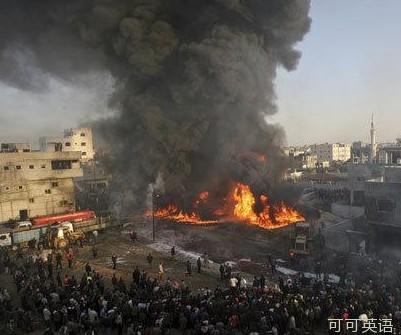(单词翻译:单击)
How do we get into wars in the first place? The framers of our Constitution had a clear idea: They gave Congress, the branch closest to the people, the power to declare war, and the President the right to prosecute it.
我们如何发起战争呢?立宪者们描述得很清楚:代表人民群众的国会有发起战争的权利,总统有执行战争的权利。

Going to war, the founders of our nation believed, should be a shared responsibility. By the time of the Vietnam War, however, Congress had watched a series of presidents send U.S. forces overseas with little or no consultation beforehand. So, in 1973, over President Nixon's veto, Congress passed the War Powers Resolution, to claim a stronger role in the decision to send our troops into combat.
我们国家的创始人相信,参加战争应是一份共同的责任。然而到越战时,多任总统在向海外输送兵力之前很少或没有与国会协商。因此在1973年,国会在尼克松总统反对的情况下,仍然通过了《战争权力决议案》,要求在决定是否派兵出战上给予国会更大权利。
The legislation has proven to be seriously flawed, however. Nothing in it actually requires joint deliberation before going to war, and it contains loopholes that presidents have been only too happy to exploit.
然而事实证明,这项立法具有严重的缺陷。实际上,在开战前没有任何事项需要共同的协商。而且总统也很乐意利用其中含有的漏洞。
Only once, after the Navy ship the Mayaguez was captured by Cambodia in 1975, has a President actually acted pursuant to the War Powers Resolution. Congress has been unable to address the ambiguities in the measure. So despite its noble attempt more than 30 years ago to restore some balance when it comes to making war, the power remains largely with the President.
在1975年美国海军船马亚圭斯号在柬埔寨被俘时,总统才依照《战争权力决议案》行动过一次,仅此一次。国会一直没能处理好这种分歧。虽然30年多前国会曾试图缓和这种失衡的现状,但一涉及到战争,总统仍然掌握着大部分权力。
原文译文属可可原创,未经允许请勿转载!


